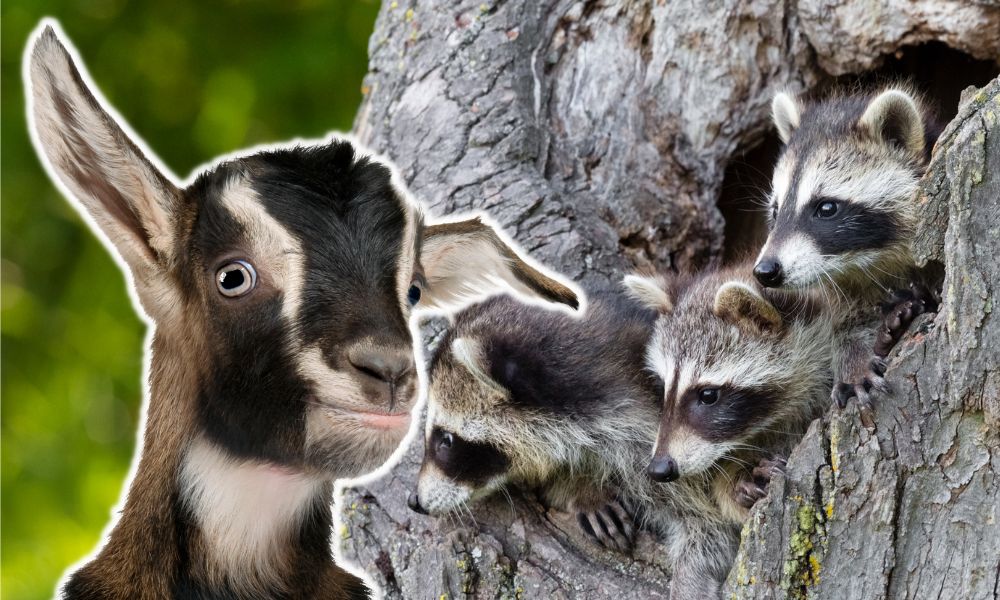Goats are large and powerful animals, in their own right.
Males can get aggressive and territorial, and a well-placed headbutt to a raccoon could be fatal.
Raccoons will have a natural aversion to any animal the size of a goat, then, but goats aren’t especially invested in deterring them.
Let’s look further into this.

Do goats keep raccoons away?
They might, is the simple answer.
It’s going to depend on a lot of things, though.
The size and breed of the goats, how aggressive and territorial they are, how bold the raccoons are, and exactly what it is they’re after.
Goats are certainly large enough and at times aggressive enough that raccoons will avoid them as best they can.
The goat will be interested in defending its own personal space.
This could deter the raccoons from coming to the farm at all—but this isn’t all that likely.
The fact is that raccoons are highly intelligent creatures, and if they’re put off once by your goats, they might well just come back another night and avoid the goats.
So, in that sense, it depends on exactly what it is you’re hoping the goats will do.
Raccoons are omnivores, and will come to raid your home for any number of reasons.
If raccoons come to your farm and raid your garbage cans, it is unlikely this is going to get the goats very riled up.
So, the other question is about whether goats will keep other predators away from your smaller animals.
Will goats protect chickens from raccoons?
No, is the short answer.
Goats will have no impulse or instinct to actively ‘protect’ another animal, certainly not members of another species.
I’m not saying it’s impossible, but you absolutely could not rely on your goats doing this.
Your chickens would still be at risk.
That said, again, if your goats and chickens are housed sufficiently close to one another, then the raccoons may be put off attempting to attack those chickens.
But at the same time, if the raccoons did decide they would attack the chickens, the goats would still only reliably defend their own personal space.
It’s, of course, entirely possible that goats could actively defend chickens from raccoons.
It’s unlikely, though, and again, you can’t rely on it happening.
So, if goats won’t keep raccoons away, what will?
What will keep raccoons away?
If you are considering an animal guard, then your best bet is some kind of guard dog or guard animal.
Goats might be big and sometimes boisterous, but you can’t train them to be a chicken’s bodyguard.
You can train a dog to do exactly that.
Dogs are always a great addition to a farm and will deter not only raccoons but also foxes and other small predators.
They can be trained to actively protect and attack encroaching wildlife.
Guinea fowl are also a popular choice as guard animals, as indeed are many birds like geese.
The advantage of these animals is that they can comfortably live outside, although they can’t be trained as robustly.
Guard dogs, in my opinion, are your best bet, and worth every penny.
That said, there’s another great way to keep raccoons away—exploiting their excellent sense of smell.
What smell keeps raccoons away?
Raccoons find food via their sense of smell.
They’re scavengers as well as predators, so they will be attracted by anything.
There are several smells they hate, that will keep them away from your farm.
One of the most popular is hot pepper.
The smell will really irritate their senses, and pepper-like cayenne pepper is readily available.
Onion, too, is a popular deterrent.
It’s not as strong a deterrent as pepper, so often people use it in combination with hot pepper.
You can make a spray using water, pepper and onion powder.
This should keep them away.
Peppermint essential oil is another choice.
There are even peppermint-based wildlife sprays, which are effective in keeping away rodents and small predators.
Finally, Epsom salt is often considered the best choice.
All you need to do is scatter it around your garden, and raccoons should be mostly put off trying to get to your farm.
So, there are many options.
The simple answer is they might.
Raccoons are smart enough to know to avoid a big goat, but they’re also smart enough to try the same thing over and over to learn your goat’s behavior.
The goat is very unlikely to be actively attempting to dissuade the raccoons, and there’s every chance the raccoons could learn how to get to where they want without disturbing the goats.
My point, then, is that you can’t rely on it if you’re trying to protect your farm from raccoons.
